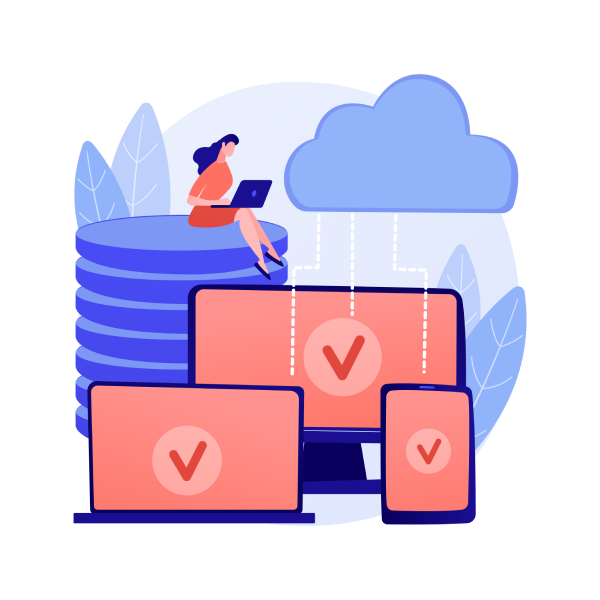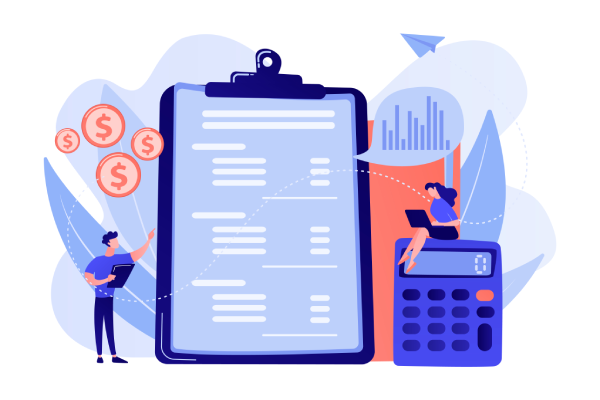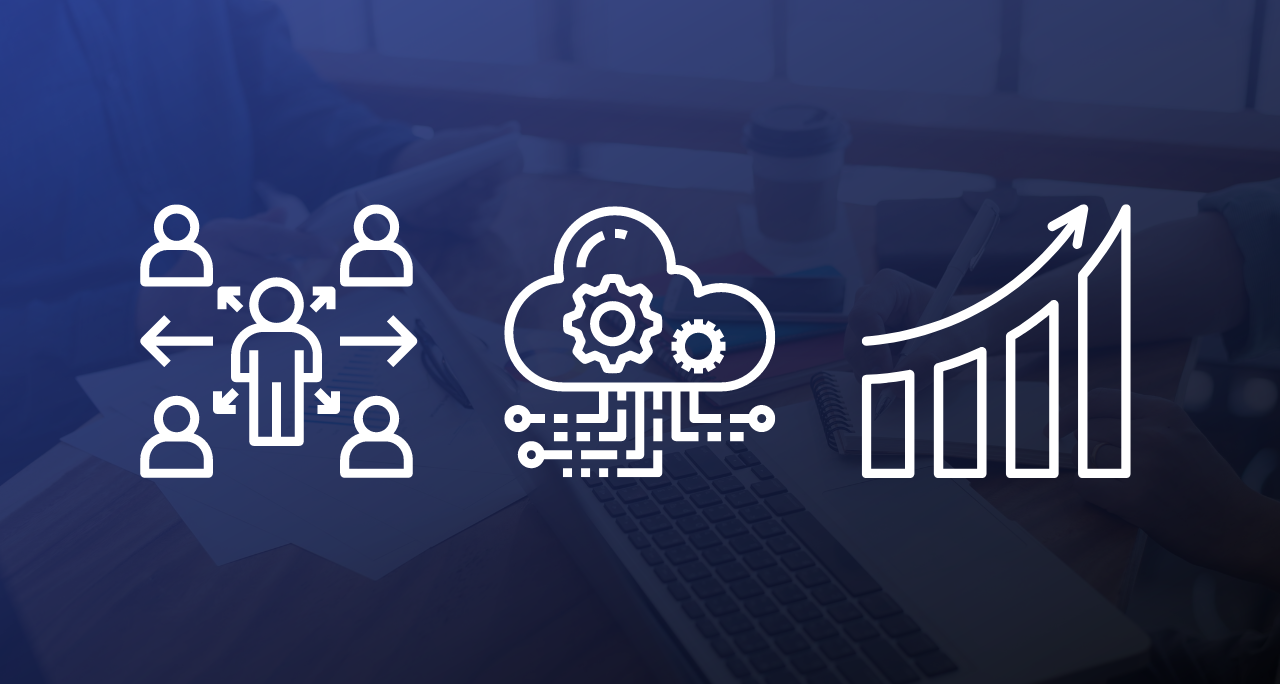Outsourcing has become an increasingly popular strategy for SaaS (Software as a Service) businesses looking to streamline their operations and reduce costs. The current size of the SaaS was estimated to be roughly USD $67 billion in 2022 – and is expected to keep growing.
One of the main advantages of the SaaS model is that it allows businesses to access software on a pay-as-you-go basis rather than having to purchase a license upfront. This is beneficial for small businesses or early startups that may not have the resources to make a large upfront investment in software.
Additionally, the SaaS model allows businesses to easily scale their use of the software up or down as needed, making it a flexible and cost-effective option.
However, as with any business model, it comes with its own set of challenges.

The complexity of a SaaS business and the benefits of outsourcing
The recurring revenue model that SaaS businesses are built on top of creates unique challenges that need to be addressed through constant innovation and improvement. These businesses often require a large and highly skilled team to handle tasks such as development, marketing, and customer support.
While it can be tempting to handle everything in-house, outsourcing certain tasks can help SaaS businesses reduce costs and focus on their core competencies.
Some benefits of outsourcing are:
- Save money: Help reduce labor and overhead costs.
- More business focus: By outsourcing non-core tasks, SaaS businesses can focus on their essential competencies and better serve their customers.
- Accelerated revenue growth: Businesses free up time and resources, allowing more focus on growth and revenue-generating activities.
- Better customer experience: Outsourcing tasks such as customer support or payment processing to specialized providers allows businesses to improve the total customer experience by developing trust and loyalty.
- Speed to scale: Outsourcing can help SaaS businesses scale more quickly by allowing them to bring on additional resources as needed.
In this article, we will further explore the complexity of a SaaS business, the advantages of outsourcing, the most commonly outsourced functions in SaaS businesses, and what to look for when choosing an outsourcing provider.
Your Metrics Tell You What is Best to Outsource
To determine which tasks to outsource, analyze your business metrics and identify areas where outsourcing could bring the most benefit.
For example, if your business is struggling with customer support response times, outsourcing this function to a 3rd-party provider with a strong track record in this area could help improve customer satisfaction.
Below are three key factors to consider when determining which business tasks should be outsourced.
Understand your weak points and outsource them according to your skills, time management, and priorities:
Another great question is, “What are my business’s strengths and weaknesses?”
By analyzing where your business lacks expertise, you have a greater chance of determining critical areas of weakness and can pivot to overcome them quickly.
For example, if your business lacks knowledge in a certain area or is struggling to keep up with demand, outsourcing may be a good option. This will free up resources and time for the business, providing an opportunity for more growth and revenue generation.
Analyze team performance and productivity at different company levels:
Finally, to determine which tasks to outsource, SaaS businesses should also carefully analyze the productivity and efficiency of their teams.
By identifying areas where team members are struggling or where tasks are taking longer than necessary, businesses can determine which functions may be better suited for outsourcing.

What is Not Recommended to Outsource?
While outsourcing can bring many benefits, certain core business capabilities should never be outsourced. These may include tasks critical to the company’s competitive advantage or unique selling proposition.
For example, a SaaS business that specializes in developing custom software for a specific industry may choose to keep development in-house to maintain control over this critical function.
Other examples would be:
- Closely tied to the company’s brand or mission: As mentioned before, a SaaS business may keep tasks such as branding and content creation in-house to ensure that they align with the company’s values and message.
- That require a high level of trust and confidentiality: Access to sensitive customer or financial data may be best kept in-house to ensure the security and privacy of this information.
At the end of the day, before outsourcing, ask yourself, “Will my brand image or business output be compromised by not doing this in-house?” If the answer is yes, then outsourcing is not a viable option.
Most Outsourced Functions in SaaS Businesses
Outsourcing certain functions can be a valuable strategy for SaaS businesses looking to grow and scale.
By understanding which tasks are typically delegated to outside vendors, you can make informed decisions about which areas of your business might benefit from outsourcing.
In this section, we will explore the most commonly outsourced functions within SaaS businesses and the benefits they can bring.
Development
It takes an average of 18 months to bring software from ideation to market. Outsourcing development tasks such as coding and software testing to specialized providers will (1) lower development costs, (2) reduce manager burden, (3) speed up project deadlines, (4) find unique talent, and (5) provide flexibility in project management.
Outsourcing development from the very start will allow your business to remain flexible in hiring the right amount of staff for any given job, without blowing out your budget. Additionally, it gives you the opportunity to recruit various contractors between multiple projects, further increasing team productivity.
Accounting and taxation
While often overlooked, accounting tasks such as bookkeeping and payroll can help SaaS businesses save time and reduce costs.
Taxation is an even more complicated field, which many SaaS sellers choose to handle through reputable global or local partners. Do not underestimate how much time taxes and recordkeeping take up – outsource these financial tasks to avoid tax troubles and unnecessary headaches.
Especially for SaaS vendors who sell their offering to multiple regions, taxation is often a much too complex area to be maintained in house, given the regional variance in this field. This is where a specialized partner comes in, helping merchants deal with indirect taxes like VAT or sales tax. SaaS taxation is still an evolving field, as per country or per state regulations receive periodic updates, and it’s often impossible for a merchant’s own in-house team to stay up-to-date with all the changes that happen here. In general, a Merchant of Record model for offering a SaaS product is recommended to vendors who want to sell their offering globally.

Payment Processing Capabilities
Payment processing is a critical function for SaaS businesses, and outsourcing this task can help improve efficiency and reduce the risk of errors. Almost all SaaS merchants handle payment processing through partners, as the cost and complexity to build these capabilities in house far exceeds the scope or capabilities of their business.
As the digital payments market increases and is expected to exceed USD $10.5 trillion by 2025, setting up a dynamic payment system with a Merchant of Record (MoR) is critical for the continued growth of any online business.
Why is this important? Because SaaS companies sell online, and with that come many barriers:
- Currency conversion
- Local processing fees
- Accessing the acquiring bank
- Regulators’ fraud restrictions
To combat this, a business would typically set up an international office, with local subsidiaries to process local transitions in each of their targeted markets – a surefire way towards a logistical and financial headache.
Using a payment processor is one way to handle getting paid for SaaS sales, however, this comes with some limitations, as such a partner doesn’t have the full strength to help with aspects like keeping processing fees cost-effective in each region , offering support to boost cart conversion rates, or guaranteeing high authorization rates on the payments you collect.
Luckily, an MoR allows your business to reach the global market and simplify your businesses integration with any specific country requirements, such as:
- Accruing duty and sales taxes
- Local laws and regulations
- Regulatory compliances
- General data protection regulations
- Local shopper payment preferences
An MoR is especially convenient for a SaaS company because it allows the company to focus on its core business and not worry about the complex and often-changing regulations surrounding online transactions.
Additionally, it helps manage subscriptions and recurring billing so that your business remits region-based taxes to the appropriate government agency.
Unless you have a solid understanding of taxes, credit card processing fees, and multiple national payment laws – using an MoR is recommended.

Branding
Finding the right people to transform your business into a brand people want to buy from is an entire challenge of its own.
Brand design outsourcing is a no-brainer if you’re not a designer because it will save you money while also raising the standard of your visual brand. Leveraging a professional’s expertise suddenly becomes the best option, being cost effective, taking the burden of a non-technical aspect off your shoulders, giving you enough time to focus on the product.
While image is indeed extremely important, many SaaS businesses choose to outsource branding tasks such as logo design and brand identity development to specialized agencies in order to ensure that their brand vision is made crystal clear to their prospective buyers.
Content and Graphics
A time-consuming task that many business owners are not used to is content and graphic design creation.
Outsourcing these tasks can help SaaS businesses save time and ensure that their marketing materials are high quality – attracting more customers and developing a better-polished brand image.
Outsourcing content writing may help you grow your revenue, publish more frequently, and produce better-quality material when you collaborate with the appropriate partner.
SEO
SEO (Search Engine Optimization) is a key factor in the success of any online business, and outsourcing this task can help SaaS businesses improve their search rankings and drive traffic to their website.
The effects of outsourcing something as important as SEO may be significant for both your company’s performance and the efficiency of your internal marketing staff. It might have either a beneficial or a devastating influence. It’s risky and takes time to win; but it may absolutely be an investment that pays off.
Promotion/PPC
Outsourcing tasks such as PPC (Pay-Per-Click) advertising and social media marketing can help SaaS businesses reach a wider audience and drive more sales.
Since PPC agencies have been in the business for a while, they have knowledge of what works and what doesn’t.
They also hire professionals with the appropriate qualifications and degree of expertise to execute marketing campaigns.
With outsourcing, you get superior quality and expertise, quick outcomes, and better time management.
Legal
SaaS businesses may choose to outsource legal tasks such as contract review and intellectual property protection to 3rd-party providers.
One key benefit, cost, is what most businesses evaluate when considering outsourcing legal services. It’s challenging to justify spending money and effort on internal legal counsel. In contrast to when you hire people, you have access to a substantially larger pool of experience and skill in external legal firms.
HR & Hiring
Outsourcing HR tasks such as payroll, employee benefits management, or development work can help SaaS businesses save time, reduce administrative burdens and find special talent.
However, with SaaS businesses often built on top of a solid development team, finding good tech talent will soon become a challenge – a sentiment shared with 61% of HR professionals.
Customer Support
Many SaaS brands outsource customer support tasks such as technical support and account management to specialized providers for improved customer satisfaction and reduced load on the business. Although you may think that customers want a personal touch, when customer service is outsourced, they are unaware that they are speaking with a third party. You get to give off the impression that your business is much bigger without needing to add more office space.

What to Look for When Choosing an Outsourcing Provider:
When choosing an outsourcing provider, SaaS businesses should consider a number of factors, including:
- Expertise: It is crucial to choose a provider that has expertise in the specific tasks being outsourced.
- Cost: While outsourcing can help save money, it is important to carefully consider the cost of the provider’s services and ensure that they align with the business’s budget.
- Communication: Good communication is key to the success of any outsourcing relationship, so it is important to choose a provider with strong communication skills.
- Location: The location of the provider can also be a factor, as outsourcing to a provider in a different time zone can impact communication and coordination.
- Nearshore outsourcing references: Nearshore outsourcing refers to outsourcing to a provider in a neighboring country. This can be a good option for SaaS businesses as it allows for easier communication and coordination while still providing cost savings compared to in-house options. Some examples of nearshore outsourcing destinations for SaaS businesses include Canada, Mexico, and various countries in Latin America.
Conclusion
Outsourcing can be a powerful tool for SaaS businesses looking to streamline their operations and save money.
It’s best not to outsource functions that don’t align with your business’s goals, or damage your brand image. Remember: due diligence is necessary for the long-term success of your brand.
By carefully considering which tasks to outsource and, by choosing a reputable provider, SaaS businesses can benefit from reduced costs, increased efficiency, and improved customer experience.
Are you looking to learn more about scaling your SaaS business? Check out our eBook for expert guidance on practical strategies to boost your subscription business.





